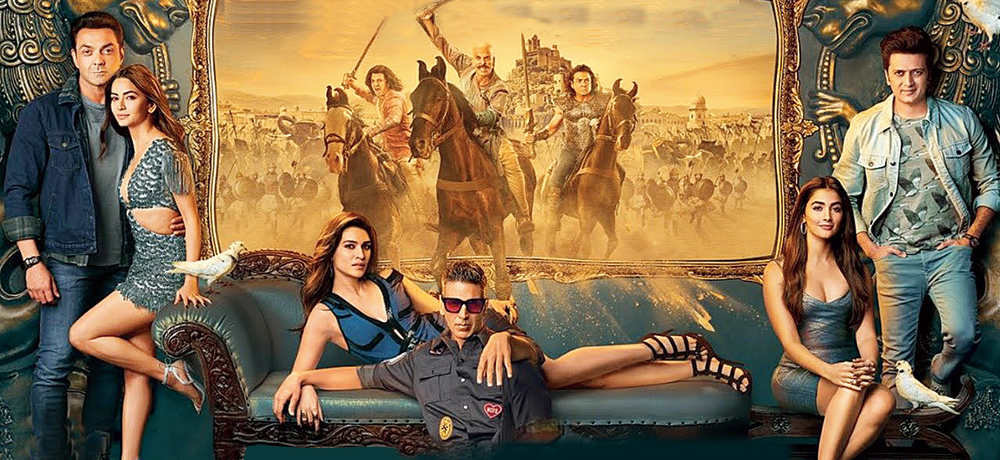The fourth installment of Housefull is a big-budget film with flamboyant sets, stellar cast and jokes so weak, one wonders if this is the same house that gave us Tamasha, 2 States and Highway. Then we remember Kick, Baaghi, Judwaa 2 and stop wondering. Rampant sexism, heroines reduced to props and mindless humour that only garners a feeble “hee-hee”, together make up the Diwali film that was meant to be a family bonanza. Narrating the tale of three lovers in 1419 Sitamgarh who are reincarnated in 2019 London, the film even ensures the three leading ladies are dressed in the same colour tone in every scene, making it increasingly difficult to tell one apart from the other.
Harry (Akshay Kumar) runs a haircutting salon in London with his two brothers Max (Bobby Deol) and Roy (Riteish Deshmukh), while harbouring a Ghajini-like disease that makes him forget everything, on hearing loud noises. The three brothers are in a debt after having lost mafia don Michael’s loot money. To compensate, they decide to marry the three daughters of billionaire Thakral and the venue of the wedding is suspiciously chosen as Sitamgarh. Amidst the setting of palaces and old cronies in the form of Aakhri Pasta (Chunky Pandey), Harry remembers his incomplete love story from 1419, only with a slight glitch — the lovers are with the wrong partners!
The six lovers Rajkumar Bala (Akshay), Bangdu Maharaj (Riteish), Angrakshak Dharamputra (Bobby) with three princesses Mala (Pooja Hegde), Meena (Kriti Kharbanda), and Madhu (Kriti Sanon) and their untimely death caused by a wild Gama’s (Rana Daggubati) thirst for revenge is the premise of the tale from 1419. What ensues hereafter is a ‘comedy’ of errors... sans the comedy.
There are women convincing their lover of their love through sexual harassment accusations, women being convinced of love for property, women being barred from discussing their marriage with their partners and father (as the men decide for them), dwindling their roles to the backup dancers who flood into the film and break into a song every three minutes. Even the slapstick element of the humour falls short as the jokes are feeble, cringe-worthy and couldn’t be saved with Akshay’s impeccable comic timing.
Riteish seems to have found his calling playing effeminate men. While his Bangdu Maharaj is a dance teacher with the seemingly unavoidable Bollywood tropes, his Roy is confused with gender while speaking in Hindi, evoking horrendous dialogues like “Isne gender ka tender nahin bhara”! Such ear-bleed-causing dialogues further continue with his own brothers derogatorily referring to him as “Ey laundiya” and telling him “Ey chhokri apni aukaat mein rahein”. While the world struggles to elevate conversations around gender roles to unexposed levels of understanding, we have Housefull 4 where the best way to ‘make someone fall in love’ is to sexually harass them in public and have the ‘hero save the girl’!
The castles and forts shown in the film are gorgeous and take one back to Sanjay Leela Bhansali, albeit like an attempted parody. Rana Daggubati has faint remains of Ranveer Singh from Padmaavat, although the man does try and hold his fort in a script that’s more feeble than Trump’s climate change control plans.
There is a guest appearance by Nawazuddin Siddiqui who plays Ramsay Baba and stays for the duration of a song. The whole purpose of his inclusion in the film was perhaps based on the need to repeat his popular Sacred Games dialogue — “Kabhi kabhi lagta hai apun hi Bhagwaan hai” — and garner some ‘woots’ from the audience. Akshay’s Bala is wildly reminiscent of The Dictator and his trope of having every voice of dissent silenced with a ‘swish swish’ gesture made at the throat, and ordering their murder. Let’s be honest, it is an exact copy of that iconic trope.
While we watched this film, we reallocated budgets from costumes, music, CGI and blonde, white backup dancers (in 1419 Sitamgarh, that too!) to a script writer with an actual sense of humour. Logic in its remotest form is absent from the film and while such absence is usually compensated by stellar humour, this film fails to even achieve that, leaving us frantically searching for reasons to drag ourselves to the theatre, Diwali or otherwise.











